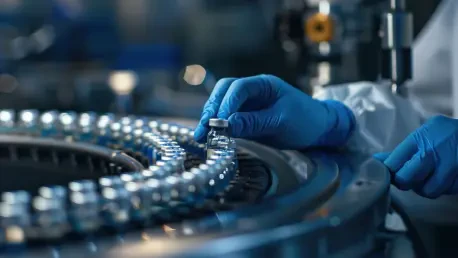In the world of pharmaceutical manufacturing, Kwame Zaire stands out as an expert with a keen focus on electronics, equipment, and production management. A thought leader in the realms of predictive maintenance, quality, and safety, Kwame shares invaluable insights into the recent $90 million expansion by Piramal Pharma in the United States. This strategic move signifies a massive scaling of capabilities aimed at enhancing both capacity and competitive edge in the pharmaceutical market. Dive into this engaging discussion to uncover more about this expansion, its impact, and trends in the pharmaceutical landscape.
Can you explain the significance of Piramal Pharma’s $90 million investment in the U.S. facilities?
This investment is a strategic endeavor by Piramal Pharma to bolster its manufacturing capabilities in the United States, which is vital for meeting increasing demand for specialized therapies like sterile injectables and antibody-drug conjugates (ADCs). It’s not just about expanding facilities but fortifying the company’s presence and operational capacity in a market that is seeing rapid growth and change.
What specific enhancements will the Lexington, Kentucky facility receive as part of the expansion?
The Lexington facility’s expansion will incorporate 24,000 additional square feet of manufacturing space, a new laboratory, and advanced machinery. This includes a new filling line, two commercial-size lyophilizers, a specialized capping machine, and an external vial washer. These enhancements are crucial for streamlining operations and scaling up the production of sterile injectables significantly.
How will the expansion at the Riverview, Michigan facility contribute to Piramal Pharma’s capabilities?
Riverview is set to enhance its capabilities specifically in the production of payload-linkers, which are essential components in ADC therapies. The expansion will introduce a commercial-scale suite tailored for developing and manufacturing these payload-linkers. This upgrade will bolster the facility’s ability to produce high-quality, stable, and effective ADC therapies, ensuring that Piramal Pharma remains competitive and responsive to market demands.
Could you elaborate on the term “payload-linkers” and why they are critical in ADC therapies?
Payload-linkers in ADC therapies are pivotal because they act as the bridge connecting the drug payload to the antibody. Their role ensures that the drug is delivered precisely to cancer cells, thus enhancing the treatment’s efficacy while minimizing damage to healthy cells. The quality and stability of these linkers are fundamental in ensuring the safety and effectiveness of ADC therapies.
What new equipment and machinery will be added to the Lexington facility, and why are they important?
Among the key additions to the Lexington facility are a new filling line, commercial-size lyophilizers, a specialized capping machine, and an external vial washer. These pieces of equipment are significant because they expand production capabilities, improve efficiency, and ensure that the facility can handle a larger volume of manufacturing processes while maintaining the highest standards of quality and safety.
By the completion of the Lexington expansion, how will the facility’s manufacturing capacity change?
Upon completion of the expansion, the Lexington facility’s manufacturing capacity will more than double, increasing from 104 product batches annually to over 240 batches. This jump in capacity will provide the flexibility and scalability needed to meet the rising demand for sterile injectables and other critical products.
What are the anticipated completion dates for the expansions in Lexington and Riverview?
The Riverview facility’s expansion is expected to be operational by the end of 2025, while the Lexington expansion is slated for completion by late 2027. These timelines reflect the strategic planning involved in scaling up operations without compromising on quality or safety.
How does this expansion align with Piramal Pharma’s integrated antibody-drug conjugate offering, ADCelerate?
The expansion is perfectly aligned with Piramal Pharma’s ADCelerate program. By enhancing both payload-linker production and sterile fill-finish capabilities, the expansions ensure that the company can deliver integrated ADC solutions with increased efficiency and capacity. This integrated approach is critical to delivering high-quality ADC therapies to the market quickly and reliably.
Why is the sterile injectables market so significant, and what are its projected trends for the next few years?
The sterile injectables market is significant due to its role in delivering sensitive and life-saving medications to patients. It is projected to exceed $20 billion by 2028, driven by the increasing need for advanced treatment options, an aging population, and the rising prevalence of chronic diseases. The demand for quick and safe delivery methods in healthcare will continue to propel this market forward.
How does Piramal Pharma plan to address the rising demand for sterile injectables and ADC therapies through these expansions?
Piramal Pharma plans to address this rising demand by scaling its manufacturing capabilities and enhancing its technological infrastructure. By expanding both Lexington and Riverview facilities, the company sets a foundation for substantial growth in its production capacity, ensuring that it can meet current and future market needs more efficiently and with a higher level of quality and innovation.
Can you discuss the importance of U.S. onshoring of drug supply in relation to this investment?
U.S. onshoring of drug supply is crucial for security and reliability in the pharmaceutical supply chain. This investment supports onshoring by strengthening Piramal Pharma’s local manufacturing capabilities. It reduces dependency on international supply chains, mitigates risks associated with disruptions, and enhances responsiveness to the U.S. market’s specific demands.
How does this investment enhance Piramal Pharma’s competitive edge in the pharmaceutical market?
The investment enhances Piramal Pharma’s competitive edge by expanding its capacity to deliver specialized therapies, improving technological capabilities, and reinforcing its commitment to supplying the U.S. market. These improvements position the company as a more robust and reliable partner in the pharmaceutical ecosystem, crucial for securing larger market share and fostering innovation.
What were the factors that influenced Piramal Pharma’s decision to invest in expanding the U.S. facilities?
Several factors influenced this decision, including the growing demand for ADC therapies and sterile injectables, the strategic importance of onshoring, and the company’s commitment to U.S.-based innovation. The U.S. market’s size and growth potential make it a key area for investment, ensuring that Piramal Pharma can continue to provide cutting-edge solutions and grow alongside market trends.
How does the expansion reflect Piramal Pharma’s belief in the benefits of U.S.-based innovation?
The expansion reflects Piramal Pharma’s belief in the power of U.S.-based innovation by investing heavily in local infrastructure and skilled workforce. It underscores the idea that fueling innovation close to demand centers, such as the U.S., leads to faster, more efficient, and relevant solutions for the pharmaceutical industry. This fosters an environment where innovation can thrive, meeting the needs of a dynamic healthcare landscape.
Do you have any advice for our readers?
My advice would be to continuously seek knowledge and stay abreast of industry trends. Embrace innovation and be adaptable to changes, especially in an industry as dynamic as pharmaceuticals. By doing so, you’ll not only remain competitive but also be part of the transformative journey shaping the future of healthcare.









